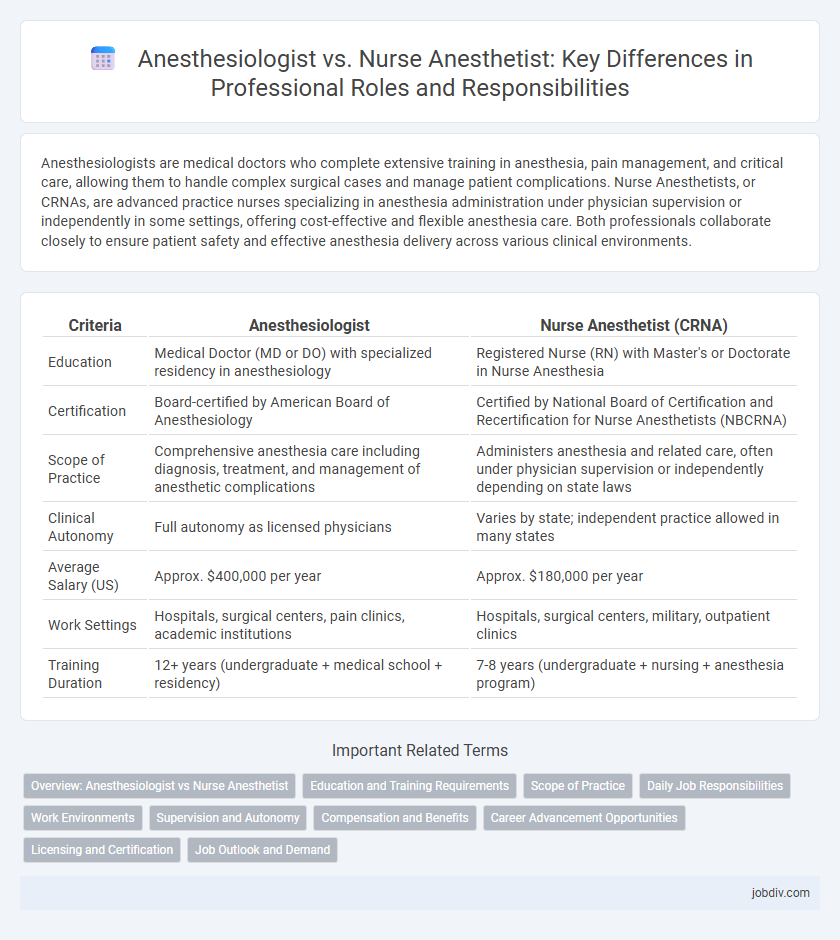Anesthesiologists are medical doctors who complete extensive training in anesthesia, pain management, and critical care, allowing them to handle complex surgical cases and manage patient complications. Nurse Anesthetists, or CRNAs, are advanced practice nurses specializing in anesthesia administration under physician supervision or independently in some settings, offering cost-effective and flexible anesthesia care. Both professionals collaborate closely to ensure patient safety and effective anesthesia delivery across various clinical environments.
Table of Comparison
| Criteria | Anesthesiologist | Nurse Anesthetist (CRNA) |
|---|---|---|
| Education | Medical Doctor (MD or DO) with specialized residency in anesthesiology | Registered Nurse (RN) with Master's or Doctorate in Nurse Anesthesia |
| Certification | Board-certified by American Board of Anesthesiology | Certified by National Board of Certification and Recertification for Nurse Anesthetists (NBCRNA) |
| Scope of Practice | Comprehensive anesthesia care including diagnosis, treatment, and management of anesthetic complications | Administers anesthesia and related care, often under physician supervision or independently depending on state laws |
| Clinical Autonomy | Full autonomy as licensed physicians | Varies by state; independent practice allowed in many states |
| Average Salary (US) | Approx. $400,000 per year | Approx. $180,000 per year |
| Work Settings | Hospitals, surgical centers, pain clinics, academic institutions | Hospitals, surgical centers, military, outpatient clinics |
| Training Duration | 12+ years (undergraduate + medical school + residency) | 7-8 years (undergraduate + nursing + anesthesia program) |
Overview: Anesthesiologist vs Nurse Anesthetist
Anesthesiologists are medical doctors specialized in anesthesia, pain management, and critical care, completing extensive medical education including a residency in anesthesiology. Nurse anesthetists, or CRNAs, are advanced practice registered nurses with graduate-level training who administer anesthesia under varying degrees of supervision depending on the clinical setting. Both professionals play crucial roles in perioperative care, with anesthesiologists often managing more complex cases and nurse anesthetists providing anesthesia services in diverse healthcare environments.
Education and Training Requirements
Anesthesiologists complete a medical degree followed by a four-year anesthesiology residency, often including fellowships for subspecialty training. Nurse anesthetists, known as CRNAs, must earn a Bachelor of Science in Nursing (BSN), acquire critical care experience, and complete a master's or doctoral program in nurse anesthesia. The extensive medical education and residency training for anesthesiologists generally exceed the duration and scope of nurse anesthetist programs, reflecting their differing scopes of practice.
Scope of Practice
Anesthesiologists are physicians with extensive medical training who diagnose and manage complex anesthesia care, including critical decision-making during surgery. Nurse anesthetists, or Certified Registered Nurse Anesthetists (CRNAs), provide anesthesia services under the supervision of anesthesiologists or independently in some states, focusing on patient monitoring and administration of anesthetics. The scope of practice for anesthesiologists includes comprehensive perioperative care and management of high-risk patients, while nurse anesthetists primarily deliver anesthesia and pain management in routine surgical settings.
Daily Job Responsibilities
Anesthesiologists manage complex anesthesia plans, oversee patient monitoring during surgeries, and handle critical decision-making in real-time. Nurse anesthetists administer anesthesia, assist in preoperative assessments, and monitor patients' vital signs throughout procedures. Both professionals ensure patient safety but differ in scope of practice and clinical autonomy within surgical settings.
Work Environments
Anesthesiologists primarily work in hospital operating rooms, intensive care units, and specialized surgical centers where they manage complex anesthesia cases and critical patient care. Nurse anesthetists often practice in similar settings but also provide anesthesia services in outpatient clinics, dental offices, and pain management facilities, offering greater flexibility in work environments. Both professionals collaborate closely with surgical teams, but anesthesiologists typically assume leadership roles in multidisciplinary care settings.
Supervision and Autonomy
Anesthesiologists operate with full medical autonomy, independently managing anesthesia care and making critical intraoperative decisions without supervision. Nurse anesthetists, or CRNAs, often practice under varying degrees of anesthesiologist supervision, depending on state regulations, hospital policies, and clinical settings. The level of autonomy for nurse anesthetists can range from direct supervision to independent practice in rural or underserved areas, reflecting a complex balance between professional roles and patient safety standards.
Compensation and Benefits
Anesthesiologists typically earn a higher median annual salary, often exceeding $300,000, compared to nurse anesthetists, whose median salary averages around $180,000 to $200,000. Benefits for anesthesiologists usually include comprehensive health insurance, retirement plans, malpractice insurance, and performance bonuses, reflecting their extensive medical training and responsibilities. Nurse anesthetists benefit from competitive health coverage, retirement options, and loan repayment programs, with additional incentives often tied to experience and geographic location.
Career Advancement Opportunities
Anesthesiologists, as medical doctors with extensive education and training, have broader career advancement opportunities including subspecialties, leadership roles in healthcare institutions, and academic positions. Nurse anesthetists, while highly skilled and often enjoying a faster path to advanced practice roles, typically have fewer options for subspecialization and administrative authority compared to anesthesiologists. Both professions offer significant advancements, but anesthesiologists generally access a wider scope of career development within surgical and critical care departments.
Licensing and Certification
Anesthesiologists must obtain a medical license by completing medical school, passing the United States Medical Licensing Examination (USMLE), and finishing a four-year anesthesiology residency. Certified Registered Nurse Anesthetists (CRNAs) require a registered nurse license, a master's or doctoral degree from an accredited nurse anesthesia program, and must pass the National Certification Examination (NCE) administered by the National Board of Certification and Recertification for Nurse Anesthetists (NBCRNA). Both professionals maintain certification through continuing education and periodic re-examinations to ensure compliance with state and national regulations.
Job Outlook and Demand
The job outlook for anesthesiologists remains robust with a projected growth rate of 3% over the next decade, driven by an aging population and advances in surgical procedures. Nurse anesthetists (CRNAs) are experiencing a faster demand increase, approximately 13%, due to expanding healthcare access and cost-effective anesthesia options in rural and underserved areas. Both roles are critical in perioperative care, but CRNAs offer greater flexibility and autonomy in various clinical settings, contributing to their strong employment growth.
Anesthesiologist vs Nurse Anesthetist Infographic

 jobdiv.com
jobdiv.com